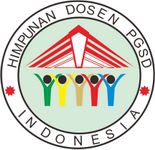Pengaruh Game Online Terhadap Perilaku Prokrastinasi Siswa Kelas 5 Sekolah Dasar Negeri Cemoro
DOI:
https://doi.org/10.31949/jee.v6i4.7627Abstract
This study tried to identify the influence of online games on the procrastination behavior of grade 5 elementary school children of SD Negeri Cemoro. The research method utilizes quantitative methods, the sampling technique used in the study is total sampling, for a sample of 51 respondents. The data obtained is then processed using the SPSS 24 program, with descriptive quantitative analysis techniques to obtain or provide an explanation of the actual situation and respond to questions about the state of the research topic. The results of this study indicate a significant influence between playing online games and procrastination behavior of grade 5 children in Cemoro State Elementary School, it was concluded that online games contribute to procrastination behavior towards grade 5 children in Cemoro State Elementary School along with the findings of the chi-square test found a p-value of < 0.05. Students who rarely play online games who very often behave proktasination does not exist, students who rarely play online games who often behave proktasination as much as 22% and students who do not behave proktasination as much as 78%. Students who played online games who had no procitation behavior as much as 2%, students who played games who sometimes behaved proxtasination often as much as 62% and students who played games who very often behaved proxtasination as much as 36%.
Keywords:
online game, procrastination, elementary schoolDownloads
References
Adiningtiyas, S. W. (2017). Peran Guru dalam Mengatasi Kecanduan Game online. KOPASTA: Journal of the Counseling Guidance Study Program, 4(1).
Bayram, S. B. (2019). Effect of a game-based virtual reality phone application on tracheostomy care education for nursing students: A randomized controlled trial. Nurse Education Today, 79, 25–31. https://doi.org/10.1016/j.nedt.2019.05.010
Bonnaire, C. (2019). Internet gaming disorder in male and female young adults: The role of alexithymia, depression, anxiety and gaming type. Psychiatry Research, 272, 521–530. https://doi.org/10.1016/j.psychres.2018.12.158
Camilleri, M. A. (2020). The students’ readiness to engage with mobile learning apps. Interactive Technology and Smart Education, 17(1), 28–38. https://doi.org/10.1108/ITSE-06-2019-0027
Dautov, D. (2020). Procrastination and laziness rates among students with different academic performance as an organizational problem. E3S Web of Conferences, 210, 18078.
Hayati, N. (2020). Hubungan Kebiasaan Bermain Game online Pada Anak Usia Sekolah Dengan Kebutuhan Istirahat Dan Tidur Di Sd Negeri 010083 Kisaran Kabupaten Asahan. Jurnal Kesehatan Global, 3(3), 116–122.
Herdian, H., & Zamal, N. (2021). The phenomenon of academic procrastination in students during pandemic. International Journal of Social Science and Human Research, 4(08), 2066–2072.
Herdiani, R. T. (2022). Fenomena Adiksi Internet Terhadap Perilaku Prokrastinasi Akademik di Era Pandemi Covid 19 (Studi Kasus Pada Siswa SD). Jurnal Pendidikan Dan Konseling (JPDK), 4(5), 4982–4988.
Huizenga, J. (2019). Mobile game-based learning in secondary education: Students’ immersion, game activities, team performance and learning outcomes. Computers in Human Behavior, 99, 137–143. https://doi.org/10.1016/j.chb.2019.05.020
Iskandar, R. (2021). Analisis tingkat kecanduan bermain game online terhadap siswa sekolah dasar. Jurnal Basicedu, 5(6), 5660–5670.
Kalogiannakis, M., Papadakis, S., & Zourmpakis, A. I. (2021). Gamification in science education. A systematic review of the literature. Education Sciences, 11(1), 1–36. https://doi.org/10.3390/educsci11010022
Kiniret, R. I. A., & Susilowati, T. (2021). Gambaran Karakteristik Anak yang Mengalami Kecanduan Bermain Game online. ASJN (Aisyiyah Surakarta Journal of Nursing), 2(2), 9–13.
Kurniawan, D. E. (2017). Pengaruh intensitas bermain game online terhadap perilaku prokrastinasi akademik pada mahasiswa bimbingan dan konseling universitas PGRI Yogyakarta. Jurnal Konseling GUSJIGANG, 3(1).
Lavy, S. (2020). A Review of Character Strengths Interventions in Twenty-First-Century Schools: their Importance and How they can be Fostered. Applied Research in Quality of Life, 15(2), 573–596. https://doi.org/10.1007/s11482-018-9700-6
Mertika, M., & Mariana, D. (2020). Fenomena Game online di Kalangan Anak Sekolah Dasar. Journal of Educational Review and Research, 3(2), 99. https://doi.org/10.26737/jerr.v3i2.2154
Nasution, M. K. (2017). Penggunaan metode pembelajaran dalam peningkatan hasil belajar siswa. STUDIA DIDAKTIKA: Jurnal Ilmiah Bidang Pendidikan, 11(1), 9–16.
Novrialdy, E. (2019). Kecanduan game online pada remaja: Dampak dan pencegahannya. Buletin Psikologi, 27(2), 148–158.
Purnamasari, V., & Wakhyudin, H. (2020). Dampak game online pubg terhadap perilaku prokrastinasi siswa. International Journal of Natural Science and Engineering, 4(1), 30–38.
Saleem, A. N. (2022). Gamification Applications in E-learning: A Literature Review. Technology, Knowledge and Learning, 27(1), 139–159. https://doi.org/10.1007/s10758-020-09487-x
Sandra, K. I. (2013). Manajemen waktu, efikasi-diri dan prokrastinasi. Persona: Jurnal Psikologi Indonesia, 2(3).
Saputra, R., Atika, A., & Sukmawati, E. (2022). ANALISIS KECANDUAN GAME ONLINE TERHADAP SISWA KELAS VII SMP NEGERI 3 SIDING. BIKONS, 2(3), 20–29.
Serra, G. (2021). Smartphone use and addiction during the coronavirus disease 2019 (COVID-19) pandemic: cohort study on 184 Italian children and adolescents. Italian Journal of Pediatrics, 47(1). https://doi.org/10.1186/s13052-021-01102-8
Shaughnessy, J. J., & Zechmeister, E B Zechmeister, J. S. (2000). Research methods in psychology. McGraw-Hill.
Shaukat, K. (2020). A Survey on Machine Learning Techniques for Cyber Security in the Last Decade. IEEE Access, 8, 222310–222354. https://doi.org/10.1109/ACCESS.2020.3041951
Smith, B. W. (2021). The Effects of a Character Strength Focused Positive Psychology Course on Undergraduate Happiness and Well-Being. Journal of Happiness Studies, 22(1), 343–362. https://doi.org/10.1007/s10902-020-00233-9
Suplig, M. A. (2017). Pengaruh kecanduan game online siswa SMA kelas X terhadap kecerdasan sosial sekolah kristen swasta di Makassar. Jurnal Jaffray, 15(2), 177–200.
Surbakti, K. (2017). Pengaruh Game online Terhadap Remaja. Jurnal Curere, 1(1), 29. http://www.portaluniversitasquality.ac.id:5388/ojssystem/index.php/CURERE/article/view/20/22
Tayibnapis, R. G. (2021). Fenomena Game online Dan Pembaruan Teknologi Komunikasi Sebagai Media Baru. Jurnal Curere, 6(11), 32–50.
Triyani, P., Aristya, F., & Erviana, L. (2021). Analisis Perilaku Prokrastinasi dengan Kebiasaan Bermain Game online dan Upaya Mereduksinya pada Siswa SD di Lingkungan Desa Pucangsewu. Doctoral Dissertation, STKIP PGRI PACITAN.
UTAMI, W. T. (2019). Hubungan kebiasaan bermain game online dengan perilaku belajar siswa kelas V SD Al-Kautsar Bandar Lampung.
Yang, S. (2019). Opportunities and challenges in using AI chatbots in higher education. In ACM International Conference Proceeding Series (pp. 79–83). https://doi.org/10.1145/3371647.3371659











